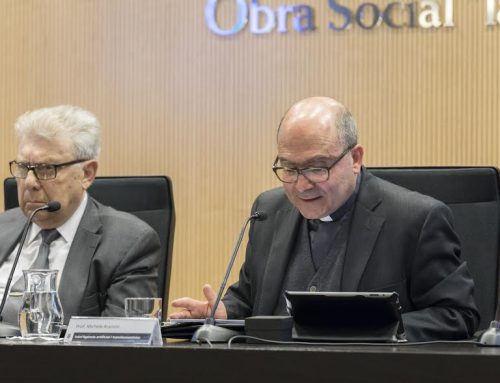Behold! The Lamb of God who takes away the sin of the world! (Jn 1:29-32)
Anne Lastman
When going to Mass on Sunday I like to go about half an hour early just to sit in the silence and almost feel the prayers which have arisen towards heaven over the many years. Silence for me at this time is healing. Fortunately, there aren’t too many times when small groups gather to discuss life matters so it’s silent with others doing the same and who, I suspect, are there at same time for same reason or simply to quietly pray.
Recently as I sat in my church, St Mary’s Cathedral, Perth, just looking at the tabernacle, I felt a sense of expectation or maybe even agitation. I couldn’t understand why but I continued to sit there with that feeling.
This Sunday’s Holy Mass we were celebrating the Solemnity of Mary, the Mother of God, honouring her motherhood as mother of Jesus, second person of the Blessed Trinity. An Older priest was celebrant at this Holy Mass. He’s a gentle priest. His homilies speak to all present, and not overly long (as the Holy Father requested just recently) with repetition in order to extend the homily and make it sound impressive, but a simple delivery or explanation of the readings so that the congregation through the years slowly learn what scriptures say to us about life from the beginning to this present age.
The words of John Baptist “Behold! The Lamb of God who takes away the SIN of the world”
(Jn.1:29-31) Hearing these words the inner agitation (a counsellour would say anxiety) began again. I’ve experienced this agitation previously every time I heard the words. “Who takes away the SIN of the world” And the priest uses the term” Sins” of the world at the elevation of the body and blood of Christ. It’s not something done only in my parish, but globally, at least every Mass I attended around the world and where I could understand the language.
Being a ponderer I have from time to time and pondered why this difference? This time, I believe I might have come to a realization as to why I feel this agitation. It’s the words SIN and SINS read in the Gospel, and our responses “sins of the world” The Gospel says “SIN” of the world and we say “SINS’ Why?
When I begin pondering over something either troubling or something new or even something which I have read or heard many times before but not taken notice, but see a new seeing, understanding, idea, keeps recurring and making itself felt until resolving of what it is that keeps persistently demanding attention or clarification of what it is causing the need for understanding. In this case the difference between “SIN” and “SINS,”. Why does scripture say “SIN” but we, the priest and congregation, say “SINS” of the world.
Sins is plural, sin is singular. So, it doesn’t make sense because many different sins are committed by humanity so why would St John Baptist say, “SIN of the world” and we say
“sins of the world” so could it possibly be and mean that the “Lamb of God” took onto himself all the sins of the world, all the sins of mankind, gathered together and collectively into one sin “of the world” All sins which will be committed by humanity because of that first sin of pride, rejection, of the word of the creator Father what we know and call Original Sin. Set the template for all sins.
Beginning with their sin, the prototype for sin was set so that it grew with every sin committed, and we can see the effects of sin when Jesus called out “My God my God why have you abandoned me” (P:s 22: Mt.27:46, Mk.15:34) The effect of sin is the barrier set up between God and man and sin. The flaming swords at the gates which forbade being able to see and be near God. The sinner cannot see God after sin because sin is impurity. Perhaps, again, we can relate it to the barrier placed at the gates of “Garden of Eden” where, after sin, the human could no longer see and walk with God because from then on to then see the face of God (because of the impurity) meant to die “you cannot see the face of God and live” (Ex 33:20) from this we can understand that on the cross when Jesus took on himself the SINS of the world and became “SIN “He could no longer see his father’s face. On the cross every cell of his human being was marred by darkness, and he could no longer see his father’s face. He who had never not been one with the Father could now not see his Father’s face. We might ask why? and an answer maybe found in Habakkuk (1:13) “thine yes are too pure to gaze upon iniquity” On the cross when Jesus was laden with all the sins of the world, he became sin itself and as a result desolation and anguish with the loss of vision of his father, abandonment. Sin breaks relationship.
From all time (since Original sin) God wanted to experience the effect of sin (barrier and isolation) and hence the need for redemption in the manner of the sinner, because with such sin and loss it would be impossible to know that for his creation to survive, a human who can experiences this and love so much can know the experience of the loss and so divinity, Jesus (second person of Trinity) took on a human body without relinquishing his divinity and with the same body as the ones who committed the first sin, experienced all experiences of the human including the absence of his father’s face. His divine nature was always present within him as son of the King, but in his humanity experienced all vicissitudes of life after sin.
Jesus in his human nature was able to experience sense of abandonment, loss, pain anguish without his divinity being affected in any way. On the cross his divinity was protected from sin like a diamond is encased under a mountain of black coal, whilst hidden within its core of the mounted the perfect diamond remained pure, whilst the black coal is visually dark and ugly to the eye, within it is the perfect diamond, so too in his humanity Jesus experienced the sins of human and its effects whilst his divinity remained pure. As a human he was encompassed by the ugliness of sins and an expectation of death (as he spoke to his apostles) until he arrived at the final moment when he reversed the final curse of death. He could then see His Father’s face, as a human and live.(Ex 33:20) where before human beings could not see God and live. As a human being, after his death and resurrection defeated. Fear of God for Himself and humanity gone, defeated.
Looking at sin from the beginning of time, its increase through the ages, it’s possible to see why the prophet spoke the words “thine eyes are too pure to gaze upon iniquity” (Hbk.1:13) Sin calls us to live impure, adulterous, scandalous lives but in God there is no sin but purity.
The sin at the beginning was so calamitous that the grief of the father also wounded the son and the Holy Spirit who wanted to repair the Creator Father’s heart, and hence Jesus’s sojourn on earth. Not only to redeem the creation from the very first to the very last but importantly to heal His Father’s pain from his creation’s betrayal.
As we look back through time, eons, it’s possible to see the reversal of that first “original sin” and would in future become possible with the assistance of the whole Trinity to effect the reversal.
Choosing a people, making covenants (vows) with them, care and protect them, lead them to a place where the physical place was found. Here, unbeknownst to people a divine transaction would be executed and completed. For this very large transaction he gave them set of rules for life or “the 10 words” to develop and refine them until a society and person would be ready to say “yes I will”
Studying the “10 words” it’s possible to see that place of sin would and could be finally cleansed.
The order of “10 words” clearly shows the importance of the order and what would be needed for the purification.
First and foremost, no idolatry to be found among the chosen people, no denigration, abusing, demeaning the name of their creator. His name forever to be kept holy.
To honour the Creator with a day of rest and thanksgiving and worshiping and meditating on the great
goodness of their God. This is semblance of his own day of rest. On the seventh day God rested from his labors (Gn 2:1-3). On this day they were to study His word, his way, his works and rest, to care of their temple (body)where He had breathed life into. Day of rest.
It’s interesting to note that the first of the three “10 words” pertain to knowing, loving, honoring God their creator. Resting in order to know him and rest in him. Trust in his goodness and promise to care for them.
The next in order importance is to honour parents (mother and father). Called to continue his creative works pf life, this by the creative works of mother and father, be fruitful and multiply and fill the temple of their bodies and the other temple (the home he had created for them (Gn 1:28) “honour your mother and father in order that all may go well for you” (Eph 6:2).
The fifth of the “10 words” the honoring and not harming of life, a strong law in order to protect life and reverse the sin of the first murder of brother against brother. The first visible sin against life and “do not shed blood because life is in the blood (Lev.17:11)and how the effects of murder, cause pain to parents, who will keep in memory the sin against brother and loss of love of neighbor.
The gravest of all sin, adultery, which leads to death, breaks first law, moral depletion, corruption, breaks bonds of marriage, breaks community, darken the body and intimacy, place of the creation of life, Adultery leads to sin which closes the gates of entry into heaven. Adultery leads to not respecting or loving neighbor “as yourself.” (part of first of the “10 words”)
Living with these rules and directions ensures the pilgrims on the journey to our real home through redemption will at times be difficult. Falling, at other times heroic. At times faithful, at other times unfaithful, but at all times continuing the journey always onward.
The second set of rules/vows are given by the Son Jesus, The Beatitudes. The world and peoples encountered and the fulfilment of His Father’s “10 words” with the Jesus’ further explanation of sin and its hatred for love. For sin has an ingrained hatred of love. Sin cannot love. Sin on its own is loveless, but sinfulness, through the work of Jesus, can release the sinner from the clutches of first and deepest of SIN of the world. The beatitudes show how good and honourable following the “10 words” can be, and their effects when followed, purity. The enfleshed “10 words” were praised. The first “10 words” were for the beginning peoples, the second words, the Beatitudes were the refinement of the “10 words” and a different people who had walked forward for many a millennium.
Jesus called out the visibility of sin and harm (woes) and the blessings of holiness for the humble, the mourning, sad, the meek, The explanation and importance of loving brother or sister, no matter how little even with a glass of water. (Mt 10:42) those who visited a sick or poor, visited the not free, whenever a kindness is done, no matter how small, to another, it will be counted as a blessing and forgiving endlessly. The visibility of the pure, gentle, loving hearts, those called to be mediators of peace, justice, compassion, the peacemakers, can be seen in those who have listened and followed the divine words. Those who seek to bring peace amongst anger, war, violence and mediate for both sides, to be able to see and show that violence destroys dignity, and destruction of relationship with the divine creator. The blessedness of these who bring hope.
Blessed are those who are called to speak about the Father, the Son Jesus and the spirit and speak plainly and with love so that those hearing will come to know that the Divine Trinity are present in their midst The martyrs, those who will be murdered, vilified, hated, abused because of belief in Jesus as the son sent by Creator to redeem the creature,
Sins of calumny, cheating, hatred, craving, lusting after what is not theirs and belong to neighbors. These are to name some of the sins and more. These and all sins are encapsuled in the “SIN” of the world which St John Baptist introduced as the one who came to take away the “SIN” of the world
Through the mediation of the son Jesus all honour is restored to the Father.
At every important moment in the life of Jesus the Father and Spirit were present to witness to the completion of the work of redemption of creation which had begun eons earlier. The “SIN” of the world engirding all sins of the world into one “SIN” which the Lamb of God came to take. Indeed, .
The “Ten Words” the “Beatitudes” the “shekinah,” (spirit) the teachings, all enfleshed by the son Jesus. His short life and shorter ministry have helped us understand mercy, love, forgiveness and perhaps help understand the meaning of the “SIN” of the world and know that Jesus has come to take that malodor of evil one and we can say with all certainty and joy that indeed He came to take the sins the world and leave with us a knowledge of His Father, who has Mercy on us because His son has mercy on us his adopted brothers and sisters..










